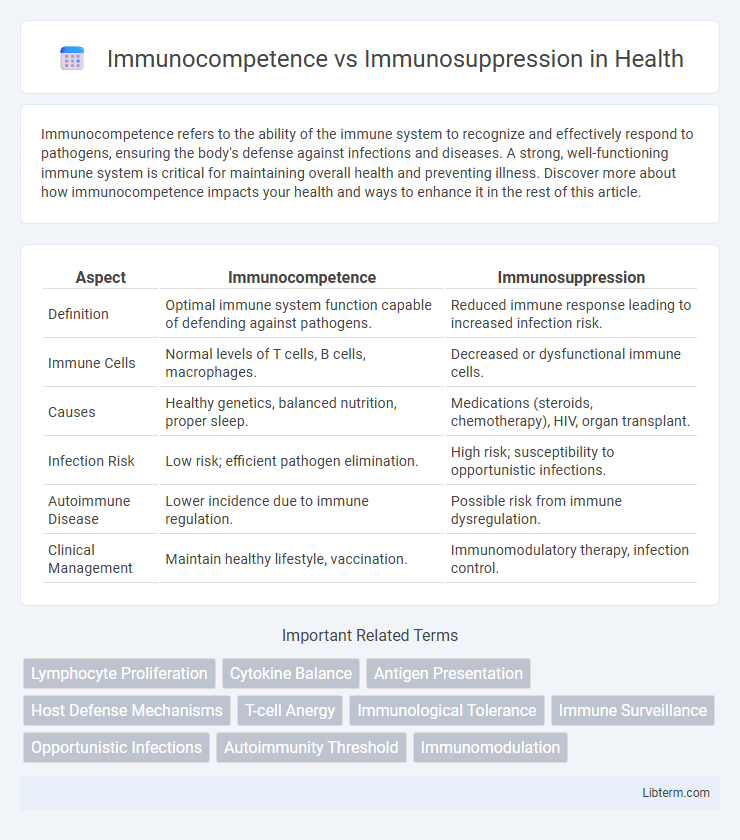Immunocompetence refers to the ability of the immune system to recognize and effectively respond to pathogens, ensuring the body's defense against infections and diseases. A strong, well-functioning immune system is critical for maintaining overall health and preventing illness. Discover more about how immunocompetence impacts your health and ways to enhance it in the rest of this article.
Table of Comparison
| Aspect | Immunocompetence | Immunosuppression |
|---|---|---|
| Definition | Optimal immune system function capable of defending against pathogens. | Reduced immune response leading to increased infection risk. |
| Immune Cells | Normal levels of T cells, B cells, macrophages. | Decreased or dysfunctional immune cells. |
| Causes | Healthy genetics, balanced nutrition, proper sleep. | Medications (steroids, chemotherapy), HIV, organ transplant. |
| Infection Risk | Low risk; efficient pathogen elimination. | High risk; susceptibility to opportunistic infections. |
| Autoimmune Disease | Lower incidence due to immune regulation. | Possible risk from immune dysregulation. |
| Clinical Management | Maintain healthy lifestyle, vaccination. | Immunomodulatory therapy, infection control. |
Introduction to Immunocompetence and Immunosuppression
Immunocompetence refers to the immune system's ability to recognize and effectively respond to pathogens, ensuring protection against infections and diseases. Immunosuppression occurs when the immune response is weakened or inhibited, either due to medical treatments like chemotherapy or conditions such as HIV/AIDS, increasing vulnerability to infections. Understanding the balance between immunocompetence and immunosuppression is critical for managing immune-related diseases and developing targeted therapies.
Defining Immunocompetence: The Body’s Defense Mechanisms
Immunocompetence refers to the immune system's ability to recognize, respond to, and eliminate pathogens effectively through innate and adaptive mechanisms, including the activity of T cells, B cells, and antigen-presenting cells. This state ensures optimal production of antibodies and memory cells, providing protection against infections and facilitating immunological memory. In contrast, immunosuppression involves the weakening of these immune responses, resulting in increased susceptibility to infections and impaired pathogen clearance.
Understanding Immunosuppression: Causes and Effects
Immunosuppression occurs when the immune system's ability to fight infections and diseases is reduced, often caused by factors such as immunosuppressive drugs, chronic illnesses like HIV/AIDS, or medical treatments like chemotherapy. This weakened immune response increases vulnerability to infections, delayed wound healing, and higher risk of malignancies. Understanding these effects helps in managing patient care, especially in transplant recipients and individuals with autoimmune disorders.
Key Differences Between Immunocompetence and Immunosuppression
Immunocompetence refers to the immune system's ability to recognize, respond to, and eliminate pathogens effectively, ensuring adequate defense against infections and diseases. Immunosuppression involves the reduction or inhibition of immune responses, either due to medical treatments like corticosteroids and chemotherapy or conditions such as HIV/AIDS, leading to increased vulnerability to infections and malignancies. Key differences include the immune system's functional status--robust and active in immunocompetence versus weakened and impaired in immunosuppression--and clinical implications related to disease susceptibility and treatment approaches.
Factors Influencing Immune System Health
Immunocompetence depends on factors such as adequate nutrition, regular exercise, sufficient sleep, and low stress levels, which collectively enhance the immune system's ability to recognize and respond to pathogens. Conversely, immunosuppression arises from conditions like chronic illness, immunosuppressive medications, malnutrition, and high stress, impairing immune function and increasing susceptibility to infections. Genetic predispositions and environmental exposures also critically influence immune system health, determining individual variability in immune responsiveness.
Clinical Conditions Associated with Immunosuppression
Immunosuppression is commonly linked to clinical conditions such as HIV/AIDS, organ transplantation, chemotherapy, and autoimmune diseases requiring immunosuppressive therapy, which impair the body's ability to mount an effective immune response. These conditions increase susceptibility to opportunistic infections like Pneumocystis jirovecii pneumonia and cytomegalovirus, as well as certain malignancies including Kaposi's sarcoma and lymphoma. In contrast, immunocompetence denotes a fully functional immune system capable of efficiently recognizing and eliminating pathogens without increased infection risk.
Measuring and Assessing Immunocompetence
Measuring and assessing immunocompetence involves evaluating the immune system's ability to mount effective responses against pathogens through various laboratory tests like lymphocyte subset analysis, immunoglobulin quantification, and functional assays such as mitogen-induced lymphocyte proliferation or antigen-specific T-cell responses. Advanced techniques, including flow cytometry and enzyme-linked immunospot (ELISPOT) assays, offer precise quantification of immune cell populations and cytokine production, essential for distinguishing between immunocompetence and immunosuppression. Accurate assessment guides clinical decision-making in immunodeficiency disorders and immunosuppressive therapy monitoring, optimizing patient outcomes.
Therapeutic Interventions in Immunosuppressed Patients
Therapeutic interventions in immunosuppressed patients emphasize tailored immunomodulatory treatments to prevent opportunistic infections and enhance immune recovery, including prophylactic antimicrobials and immune-boosting biologics like cytokines or monoclonal antibodies. Careful monitoring of immune function biomarkers such as CD4+ T-cell counts and neutrophil levels guides dosage adjustments of immunosuppressive drugs to minimize adverse effects while preserving graft tolerance or disease control. Emerging strategies involve personalized immunotherapy approaches using checkpoint inhibitors or adoptive T-cell transfer to restore immunocompetence without triggering allograft rejection or autoimmune complications.
Lifestyle Impact on Immune Function
Immunocompetence, the immune system's ability to effectively respond to pathogens, is heavily influenced by lifestyle factors such as nutrition, sleep quality, and stress management, which enhance immune resilience. Conversely, immunosuppression results from chronic stress, poor diet, inadequate sleep, and excessive alcohol consumption, all of which weaken immune defenses and increase susceptibility to infections. Regular physical activity, balanced micronutrient intake, and sufficient rest promote optimal immune function by supporting cellular immunity and reducing inflammatory markers.
Future Perspectives in Immunology Research
Advancements in immunology research are rapidly pushing the boundaries between immunocompetence and immunosuppression, with novel therapies targeting immune modulation to enhance disease resistance and reduce autoimmune responses. Cutting-edge techniques such as CRISPR-Cas9 gene editing and single-cell RNA sequencing are enabling precise manipulation and characterization of immune cells, paving the way for personalized immunotherapies. The future of immunology lies in integrating multi-omics data and artificial intelligence to predict immune outcomes and develop tailored interventions that balance immune activation and suppression for optimal health.
Immunocompetence Infographic

 libterm.com
libterm.com